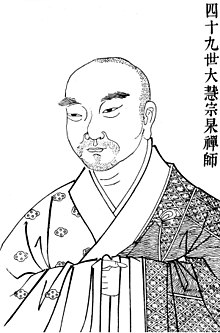Our website is made possible by displaying online advertisements to our visitors.
Please consider supporting us by disabling your ad blocker.
Dahui Zonggao
Dàhuì Zōnggǎo | |
|---|---|
 | |
| Personal life | |
| Born | 1089 |
| Died | 10 August 1163 (aged 73-74) |
| Religious life | |
| Religion | Buddhism |
| School | Linji |
| Senior posting | |
| Predecessor | Yuanwu Keqin |
| Part of a series on |
| Zen Buddhism |
|---|
 |
| Part of a series on |
| Buddhism |
|---|
 |
Dahui Zonggao (1089–10 August 1163) (Chinese: 大慧宗杲; Wade–Giles: Ta-hui Tsung-kao; Japanese: Daie Sōkō; Vietnamese: Đại Huệ Tông Cảo) was a 12th-century Chinese Chan (Zen) master. Dahui was a student of Yuanwu Keqin (Wade–Giles: Yuan-wu K'o-ch'in; Japanese: Engo Kokugon) (1063–1135) and was the 12th generation of the Linji school of Chan Buddhism. He was the dominant figure of the Linji school during the Song dynasty.[1]
Dahui introduced the practice of kan huatou, or "inspecting the critical phrase," of a kōan story. This method was called the "Chan of gongan (kōan) introspection" (看話禪 Kanhua Chan).[2]
Dahui was a vigorous critic of what he called the "heretical Chan of silent illumination" (默照邪禪 Mozhao Xie Chan) of the Caodong school (Wade–Giles: Ts'ao-tung; Japanese: Sōtō).
- ^ McRae 2003, pp. 123–133.
- ^ Yu, p. 211
Previous Page Next Page


